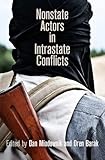Nonstate Actors in Intrastate Conflicts / ed. by Dan Miodownik, Oren Barak.
Material type: TextSeries: National and Ethnic Conflict in the 21st CenturyPublisher: Philadelphia : University of Pennsylvania Press, [2013]Copyright date: ©2014Description: 1 online resource (256 p.) : 1 illusContent type:
TextSeries: National and Ethnic Conflict in the 21st CenturyPublisher: Philadelphia : University of Pennsylvania Press, [2013]Copyright date: ©2014Description: 1 online resource (256 p.) : 1 illusContent type: - 9780812245431
- 9780812208672
- 341.5/84 23
- JC328.5 .N67 2014eb
- online - DeGruyter
- Issued also in print.
| Item type | Current library | Call number | URL | Status | Notes | Barcode | |
|---|---|---|---|---|---|---|---|
 eBook
eBook
|
Biblioteca "Angelicum" Pont. Univ. S.Tommaso d'Aquino Nuvola online | online - DeGruyter (Browse shelf(Opens below)) | Online access | Not for loan (Accesso limitato) | Accesso per gli utenti autorizzati / Access for authorized users | (dgr)9780812208672 |
Frontmatter -- Contents -- Introduction -- 1. The 'Modern Sherwood Forest': Theoretical and Practical Challenges -- 2. Framing to Win: The Transnational Recruitment of Foreign Insurgents -- 3. State, Society, and Transnational Networks: The Arab Volunteers in the Afghan War (1984-1990) -- 4. A Conceptual Framework for Understanding the Roles of Diasporas in Intrastate Conflicts -- 5. Turkey's Dual Problem: Between Armenia and the Armenian Diaspora -- 6. Turkey, the Kurds, and Turkey's Incursions into Iraq: The Effects of Securitization and Desecuritization Processes -- 7. From a Militia to a Diasporic Community: The Changing Identity of the South Lebanese Army -- 8. Domestic-Regional Interactions and Outside Intervention in Intrastate Conflicts: Insights from Lebanon -- Notes -- Bibliography -- List of Contributors -- Index -- Acknowledgments
restricted access online access with authorization star
http://purl.org/coar/access_right/c_16ec
Intrastate conflicts, such as civil wars and ethnic confrontations, are the predominant form of organized violence in the world today. But internal strife can destabilize entire regions, drawing in people living beyond state borders-particularly those who share ideology, ethnicity, or kinship with one of the groups involved. These nonstate actors may not be enlisted in formal armies or political parties, but they can play a significant role in a conflict. For example, when foreign volunteers forge alliances with domestic groups, they tend to attract other foreign interventions and may incite the state to centralize its power. Diasporan populations, depending on their connection to their homeland, might engage politically through financial support or overt aggression, either exacerbating or mitigating the conflict.Nonstate Actors in Intrastate Conflicts takes an interdisciplinary approach to understanding the ways external individuals and groups become entangled with volatile states and how they influence the outcome of hostilities within a country's borders. Editors Dan Miodownik and Oren Barak bring together top scholars to examine case studies in Afghanistan, Lebanon, Israel/Palestine, and Turkey in order to explore the manifold roles of external nonstate actors. By shedding light on these overlooked participants-whose causes and consequences can turn the tide of war-Nonstate Actors in Intrastate Conflicts provides a critical new perspective on the development and neutralization of civil war and ethnic violence.Contributors: Oren Barak, Chanan Cohen, Robert A. Fitchette, Orit Gazit, Gallia Lindenstrauss, Nava Löwenheim, David Malet, Dan Miodownik, Maayan Mor, Avraham Sela, Gabriel (Gabi) Sheffer, Omer Yair.
Issued also in print.
Mode of access: Internet via World Wide Web.
In English.
Description based on online resource; title from PDF title page (publisher's Web site, viewed 30. Aug 2021)


